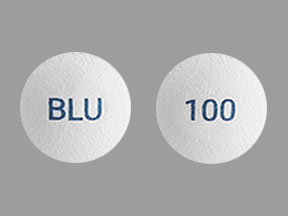Ayvakit Interactions
There are 469 drugs known to interact with Ayvakit (avapritinib), along with 3 disease interactions, and 1 alcohol/food interaction. Of the total drug interactions, 214 are major, 253 are moderate, and 2 are minor.
- View all 469 medications that may interact with Ayvakit
- View Ayvakit alcohol/food interactions (1)
- View Ayvakit disease interactions (3)
Most frequently checked interactions
View interaction reports for Ayvakit (avapritinib) and the medicines listed below.
- Afrin Original (oxymetazoline nasal)
- albuterol
- Ambien (zolpidem)
- Benadryl (diphenhydramine)
- Celebrex (celecoxib)
- Centrum (multivitamin with minerals)
- Citracal + D (calcium / vitamin d)
- clonazepam
- Compazine (prochlorperazine)
- diltiazem
- dimenhydrinate
- Dulcolax Stool Softener (docusate)
- famotidine
- Feosol Original (ferrous sulfate)
- Flonase (fluticasone nasal)
- folic acid
- grape juice, purple
- hydroxyzine
- ketotifen ophthalmic
- Lexapro (escitalopram)
- Lipitor (atorvastatin)
- loperamide
- magnesium oxide
- meclizine
- metformin
- modafinil
- montelukast
- Norvasc (amlodipine)
- Omega-3 (omega-3 polyunsaturated fatty acids)
- Vitamin D3 (cholecalciferol)
Ayvakit alcohol/food interactions
There is 1 alcohol/food interaction with Ayvakit (avapritinib).
Ayvakit disease interactions
There are 3 disease interactions with Ayvakit (avapritinib) which include:
More about Ayvakit (avapritinib)
- Ayvakit consumer information
- Compare alternatives
- Pricing & coupons
- Reviews (1)
- Drug images
- Side effects
- Dosage information
- During pregnancy
- FDA approval history
- Drug class: multikinase inhibitors
- Breastfeeding
- En español
Related treatment guides
Drug Interaction Classification
| Highly clinically significant. Avoid combinations; the risk of the interaction outweighs the benefit. | |
| Moderately clinically significant. Usually avoid combinations; use it only under special circumstances. | |
| Minimally clinically significant. Minimize risk; assess risk and consider an alternative drug, take steps to circumvent the interaction risk and/or institute a monitoring plan. | |
| No interaction information available. |
See also:
Further information
Always consult your healthcare provider to ensure the information displayed on this page applies to your personal circumstances.


